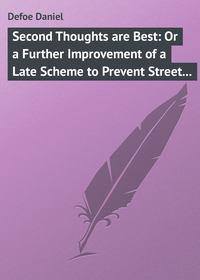Kitabı oku: «Second Thoughts are Best: Or a Further Improvement of a Late Scheme to Prevent Street Robberies», sayfa 2
In the mean time I stand prepared for the sneers of those who despise everything and everybody but their own dear selves, as also the objections of the puzzle causes, who will turry-lugg a thing out of all sense and meaning, and by the cloudiness of their explanations darken what is most plain and obvious. My business is to go straight forward, and let the end crown the work. If men of sense approve me, I need not value the laughter of fools, whose very approbation is scandal; for if a thinking man is to be laughed out of every good intention or invention, nothing will ever be done for the public good.
SECOND THOUGHTS, &c
The principal encouragement and opportunity given to our street robbers is, that our streets are so poorly watched; the watchmen, for the most part, being decrepit, superannuated wretches, with one foot in the grave and the other ready to follow; so feeble that a puff of breath can blow them down. Poor crazy mortals! much fitter for an almshouse than a watchhouse. A city watched and guarded by such animals is wretchedly watched indeed.
Nay, so little terror do they carry with them, that hardy thieves make a mere jest of them, and oftentimes oblige even the very watchman who should apprehend, to light them in their roguery. And what can a poor creature do, in terror of his life, surrounded by a pack of ruffians, and no assistance near?
Add to this, that our rogues are grown more wicked than ever, and vice in all kinds is so much winked at, that robbery is accounted a petty crime. We take pains to puff them up in their villany, and thieves are set out in so amiable a light in the Beggar's Opera, it has taught them to value themselves on their profession rather than to be ashamed of it.
There was some cessation of street robberies, from the time of Bunworth and Blewitt's execution, until the introduction of this pious opera. Now we find the Cartouchian villanies revived, and London, that used to be the most safe and peaceful city in the universe, is now become a scene of rapine and danger. If some of Cartouch's gang be not come over hither to instruct our thieves, we have, doubtless, a Cartouch of our own, and a gang which, if not suppressed, may be full as pernicious as was ever Cartouch's, and London may be as dangerous as Paris, if due care be not taken.
Not content with the mischief done by the Beggar's Opera, we must have a Quaker's Opera, forsooth, of much more evil tendency than the former; for in this Jack Shepherd is made the hero of the drama, and runs through such a scene of riot and success, that but too many weak minds have been drawn away, and many unwary persons so charmed with his appearance on the stage, dressed in that elegant manner, and his pockets so well lined, they have forthwith commenced street-robbers or housebreakers; so that every idle fellow, weary of honest labour, need but fancy himself a Macheath or a Shepherd, and there is a rogue made at once. Since, therefore, example, has such force, the stage ought to be reformed, and nothing exhibited but what might be represented before a bishop. They may be merry and wise: let them take the Provoked Husband for a pattern.
A good physician seeks the cause, and weighs the symptoms before he proceeds to prescribe; and if we trace this evil from its radix, we shall find a cause antecedent to the two operas aforesaid: namely, accursed Geneva, the bane and ruin of our lower class of people.
Those who deny an inferior class of people to be necessary in a body politic, contradict reason and experience itself; since they are most useful when industrious, and equally pernicious when lazy. By their industry our manufactures, trade, and commerce, are carried on. The merchant in his counting-house, and the captain in his cabin, would find but little employment, were it not that many hands carried on the different branches of the concerns they superintended.
But now so far are our common people infatuated with Geneva, that half the work is not done now as formerly. It debilitates and enervates them, nor are they near so strong and healthy as formerly.
So that if this abuse of Geneva be not stopped, we may go whoop for husbandmen, labourers, &c.; trade must consequently stand still, and the credit of the nation sink. Nor is the abatement of the excise, though very considerable, and most worthy notice, any ways comparable to the corruption of manners, destruction of health, and all the train of evils we are threatened with from pernicious Geneva.
We will suppose a man able to maintain himself and family by his trade, and at the same time to be a Geneva drinker. This fellow first makes himself incapable of working by being continually drunk; which runs him behindhand, so that he either pawns, or neglects his work, for which reason nobody will employ him. At last, fear of arrests, his own hunger, the cries of a family for bread, his natural desire to support an irregular life, and a propense hatred to labour, turn but too many an honest tradesman into an arrant desperate rogue. And these are commonly the means that furnish us with thieves and villains in general.
